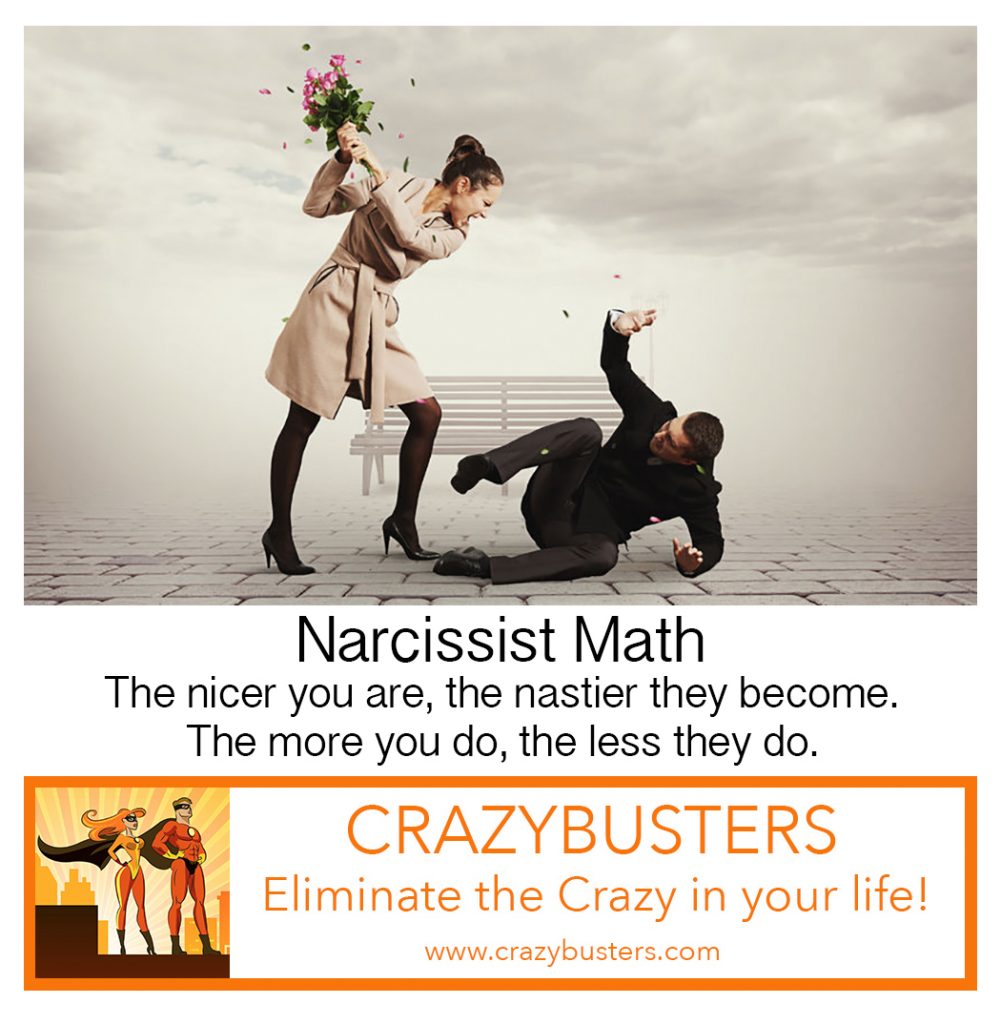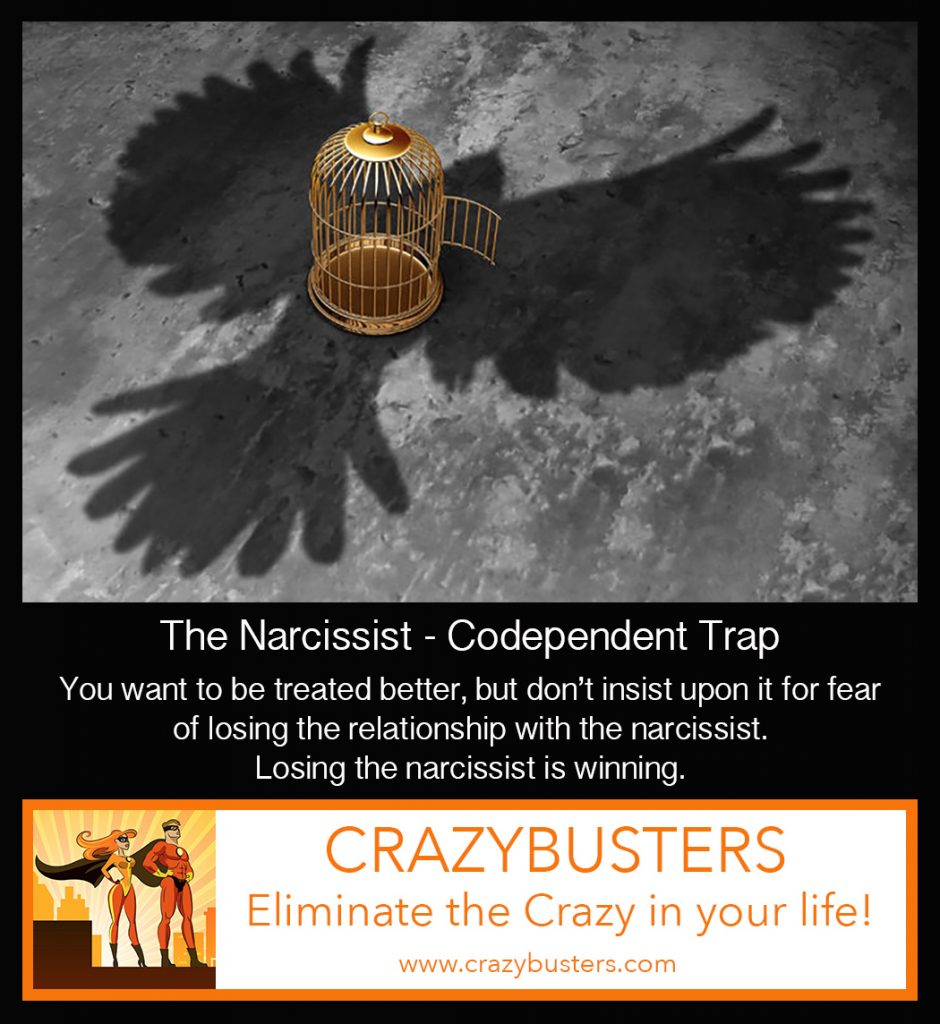Feed a Fever Starve a Psycho Dr Tara Palmatier
 People who chronically abuse others usually have some kind of personality disorder — e.g., narcissists, borderlines, psychopaths and histrionics. Typically, these individuals live on one-way streets paved with double standards, with one set of rules and expectations for themselves and another for you. In other words, they're great big hypocrites. Narcissists and their ilk also have peculiar definitions of concepts such as fair, equal and compromise.
People who chronically abuse others usually have some kind of personality disorder — e.g., narcissists, borderlines, psychopaths and histrionics. Typically, these individuals live on one-way streets paved with double standards, with one set of rules and expectations for themselves and another for you. In other words, they're great big hypocrites. Narcissists and their ilk also have peculiar definitions of concepts such as fair, equal and compromise.
Fair means, "I get everything I want when I want." Equal means, "I get everything I want when I want." And compromise means, "I get everything I want when I want." Notice the theme? Narcissists are simply too self-absorbed to give a flying fudge about anyone else's wants, needs and feelings, but their own. These ultimate navel gazers will accuse you of being selfish and mean if you're not as focused on their belly buttons as they are.
But what about mutuality, reciprocity and good old-fashioned give and take? Sssssspppppppllllllllffffffftttttttt!!!!!!!!
Years ago, I briefly dated a man whom I'm fairly certain, in retrospect, had borderline personality disorder with several narcissistic features. During the first few weeks of dating he emailed, "It's so nice to finally meet someone with no needs of her own, so she can spend all of her time focusing on mine." [Insert record scratch sound effect.] Narcissists and borderlines say the darnedest things!
First, I checked to see if he was joking. He wasn't. Then I responded that I did, in fact, have wants and needs, but they were reasonable and meet-able. His response? Crickets.
His unintentionally shrewd observation is a good summary of the relationship dynamic between a codependent and a narcissist-borderline-psychopath-histrionic-Unidentified Flying Crazy (e.g., diagnostically speaking, alphabet soup). That's what narcissists want in an accessory, appendage, prop, stooge, lackey, enabler, flying monkey, Igor, partner — someone who will focus on them exclusively and at a huge cost to your own well-being.
That's not fair. It's not equal. There's no compromise, just capitulation and accommodation. It also doesn't add up, which brings us to a little something I like to call Narcissist Math, in which the narcissist believes 2 + 2 = ME! ME! ME!
In Narcissist Math:
You do more. The narcissist does less.
You try to be ever more compassionate and understanding. The narcissist becomes crueler and more contemptuous.
You share everything you have. The narcissist becomes stingier.
You try harder. The narcissist becomes more demanding.
You're faithful to the point that you don't even make eye contact with members of the opposite sex (or same sex as the case may be). The narcissist cheats.
The statements above are what a narcissist thinks of as a fair and equal relationship. In reality, it's anything but. The longer you remain the the relationship the more the scales become increasingly imbalanced over time. You can try using facts, logic and reason to point out the inequities in the relationship, however, all that usually gets you is a tantrum, rage episode or some world class gaslighting as they tell you with a straight face that they do EVERYTHING in the relationship and you'd better start pulling your weight.
Drop the rope and set yourself free. It just isn't worth it. Unless you want your epitaph to read, "Here lies Conrad/Connie Codependent. They tried their best. It just wasn't good enough."
 Want to Say Goodbye to Crazy? Buy it HERE.
Want to Say Goodbye to Crazy? Buy it HERE.
Counseling, Consulting and Coaching with Dr. Tara J. Palmatier, PsyD
Dr. Tara J. Palmatier, PsyD provides services to help individuals work through their relationship issues via telephone or Skype, particularly men and women who trying to break free of an abusive relationship, cope with the stress of an abusive relationship or heal from an abusive relationship. She combines practical advice, support, reality testing and goal-oriented outcomes. Please visit the Schedule a Session page for professional inquiries.
Save
Save
Save
Save
 Why do victims of narcissists, borderlines, histrionics and psychopaths stay in abusive, toxic relationships well past the point of expiration? Even when they're checked out, shell-shocked and empty? My clients often say they feel trapped in the relationship. Sometimes it has to do with children, and children do create logistical, albeit not insurmountable issues. So what's the real trap?
Why do victims of narcissists, borderlines, histrionics and psychopaths stay in abusive, toxic relationships well past the point of expiration? Even when they're checked out, shell-shocked and empty? My clients often say they feel trapped in the relationship. Sometimes it has to do with children, and children do create logistical, albeit not insurmountable issues. So what's the real trap?
You'd like to have boundaries and a healthier relationship, but here's the rub. You can't have a healthy relationship with someone who is personality disordered. That's like trying to get sober while chugging Jack Daniels. If you decide to work on your codependency and become healthier, the narcissist or borderline's dysfunction will seem more extreme.
This is due to the contrast between health and pathology. It's also due to actual decompensation and escalation triggered by the borderline or narcissist's perceived loss of control. The healthier you become, the less tolerable the narcissist and the relationship will become. In other words, you getting healthy most likely means the end of the relationship, which causes FOG — feelings of fear, obligation and guilt.
Fear. You're afraid to be alone. You're afraid you'll never meet someone else, or that you'll meet someone far worse. You're afraid you won't feel that same ZING! with emotionally stable women and men. If healthy, stable adults seem boring to you, that means you need to do some work on yourself. This is entirely within your power to do.
You're afraid they'll smear you, ruin your reputation, try to get you fired or destroy your relationship with the kids. Narcissists and borderlines typically begin the smear and parental alienation campaigns long before you divorce. You're afraid the narcissist or borderline will miraculously become a decent, loving person with their next girlfriend or boyfriend. That's not going to happen. Don't believe their self-serving, self-aggrandizing social media press releases. The majority of their Facebook and Instagram posts amount to nothing more than turd polishing.
Obligation. You feel obligated. You made a commitment, which the narcissist nullified with her or his abuse. Who will take care of the borderline and her children by other men? Seriously, dude — if the kids aren't yours they are not your responsibility. You can't save those kids from their mother. The only way to do that is to remove them from the abusive mother. That is the biological father's responsibility. Even if he was able to secure custody, the kids are still going to have issues. No one escapes a disordered parent unscathed.
He divorced his wife for you (after cheating on his ex with a series of women throughout the marriage). You owe it to him to stay with him after "everything he gave up." Otherwise, your affair was actually just another affair and seems a lot less noble. He wouldn't have cheated if not for you. Er, yeah right. Narcissists don't do what they don't want to do. On the rare occasions when they do something they don't want to do, you know it by the epic tantrum that ensues. Telling you that they "sacrificed" their marriage is just a way to absolve themselves of responsibility for cheating on their former spouse and family.
Guilt. You feel guilty. What will happen to the poor little narcissist or borderline if you "abandon" them? You abandon a car; you leave an adult. What if she or he tries to commit suicide? Then they belong in an emergency psychiatric unit, not a relationship. How will she or he ever take care of themselves? They won't.
Most likely the parasite will latch onto their next host/enabler so fast it'll make your head spin, which takes you back to fear. Did the narcissist, borderline or psychopath ever love you? No, they're not capable of it. How could the narcissist move on so quickly to the next man or woman? Didn't you mean anything to them? Probably not. Supply is supply with one caveat — new supply is juicier and more fun than old supply.
You're miserable, but the thought of ending the relationship is terrifying and feels even worse. You desperately want the narcissist to treat you like she or he did during the love bombing or idealization stage, and cling onto that hope (i.e., wishful thinking). You feel trapped, but you're not trapped.
You're in a cage and the door is wide open. The trap is your emotions and wanting the impossible to be possible — for the narcissist to stop being a narcissist. When a narcissist or borderline is abusing you, dismissing your needs, exploiting you, lying to you, cheating on you, etc., you can say, "This doesn't work for me. I'm done."
Narcissists train their victims not to expect much, if anything, from them very early on in the relationship. And if you do, they rage, tantrum, gaslight, name-call and threaten to dump you. You just want to go back to the honeymoon stage and believe it's possible, so you stop holding Vampira or Count Vlad accountable. You stop sharing your feelings and don't ask anything of the narcissist, all the while hoping they'll miraculously change.
The aforementioned fears kick in and keep you in self-imposed bondage. You know if you stand up for yourself and insist on decent treatment you may very well lose the narcissist and the relationship. That's the trap. Things can't be better, you're not going to feel better and live better if you stay with the narcissist. In this respect, losing the narcissist or borderline is winning.
 Want to Say Goodbye to Crazy? Buy it HERE.
Want to Say Goodbye to Crazy? Buy it HERE.
Counseling, Consulting and Coaching with Dr. Tara J. Palmatier, PsyD
Dr. Tara J. Palmatier, PsyD provides services to help individuals work through their relationship issues via telephone or Skype, particularly men and women who trying to break free of an abusive relationship, cope with the stress of an abusive relationship or heal from an abusive relationship. She combines practical advice, support, reality testing and goal-oriented outcomes. Please visit the Schedule a Session page for professional inquiries.
Save
Save
Save
Save
Save
Save
Save
 I recently joked with a client who has a narcissistic ex-girlfriend about the importance of maintaining No Contact, making a play on the old folk saying, "Feed a fever. Starve a cold." (Feed a fever. Starve a psycho). Since the break-up 2 months ago, his ex has been intermittently boundary testing via text and email. He's tempted to reply. Not because he misses her, but to tell her off.
I recently joked with a client who has a narcissistic ex-girlfriend about the importance of maintaining No Contact, making a play on the old folk saying, "Feed a fever. Starve a cold." (Feed a fever. Starve a psycho). Since the break-up 2 months ago, his ex has been intermittently boundary testing via text and email. He's tempted to reply. Not because he misses her, but to tell her off.
During the relationship she did the usual — gaslighting, projection, lying, accused him of cheating, financially exploited him, tantrums, tried isolating him from friends and family, suicide threats whenever he tried to end the relationship, etc. The tipping point in his decision to break-up was when she took the fake suicide threat to a whole new level. She texted him a suicide selfie.

Suicide Selfie with Nail Polish Blood
Yes, you read that right. A suicide selfie.
She painted iridescent nail polish cut marks on her arm and a pair of scissors, photographed it and texted it to him. Instead of rushing to her apartment like he'd done after her previous two fake suicide threats, he called the police. They went to his ex's place to check on her and she denied being suicidal. Her roommate later informed my client it was nail polish, not blood. Oh, I almost forgot to mention, my client's ex knows there have been actual suicides in his family. She used this information to manipulate and abuse him, which is utterly despicable, but I digress.
As tempting as it is for him to reply, "No, I don't miss you, you wretched whackjob," he understands that the best response is no response.
No Contact can be one of the easiest and most difficult self-care activities to practice and master after ending a relationship with a narcissist or other abusive personality. It's easy in the sense that it requires you do nothing, or nothing beyond using your phone or social media's Block feature. Don't answer the phone. Don't reply to emails, texts and voicemails. Don't open the door. Refuse to go have coffee if she or he ambushes you as you leave the office or gym. When it comes to No Contact, no means no.
There are different reasons why some people have such a tough time implementing No Contact. You lovvvvvvvve the narcissist and aren't ready to let go. You're struggling with codependence and feel guilty about no longer wanting to tolerate the narcissist's abuse (reread this sentence a few times until it sinks in). You're engaging in some form of bargaining and denial (stages of grief) and think you can have a friendship with your abuser. You haven't emotionally detached and are allowing yourself to be baited into justifying, arguing, defending and explaining (JADE) when the narcissist sends loaded text traps like:
"You never loved me!" Irrelevant now and impossible to prove or disprove. Ignore.
"I know you cheated on me! I have proof!!!" You didn't, impossible to disprove and it's irrelevant now. Ignore.
"Stop talking to my friends!!!" You're not. If you are, why are you? Ignore.
"If you don't reply to this I will assume the answer is yes." This is a tricksy tactic, but in a court of law silence doesn't imply consent. Ignore.
"What kind of weirdo won't return a text (or 736 of them in a 48 hour period)?!?!? YOU NEED HELP!!!!!!!! Call me! xo" Ignore.
"If you don't come see me I'm going to kill myself!" Call 911. Then ignore.
Responding to Crazy, even an angry "Leave me alone!" response, only teaches her or him that if they persist long enough, escalate their behavior and/or threaten and intimidate you that they're going to get a reaction or face-to face time with you. Breaking No Contact almost always results in more contact and returning to square on in your boundary setting and enforcement. Don't do it.
There's one caveat. If you're planning to file a non-harassment or restraining order, most courts require that you communicate in writing to Crazy that she or he leave you alone. Please consult with an attorney about this as laws vary from nation to state to province.
What if you have kids with Crazy? You can practice a modified form of No Contact called Low Contact. It's possible to have boundaries and not get dragged into Crazy's emotional maelstroms even with shared children. In fact, if you share kids with Crazy, it's better for you and the kids if you practice Low Contact and keep the conflict to a minimum. If you don't know what parallel parenting is it's time to do some research.
Why is No Contact so important after breaking up with an abusive person? Because it gives you time and space for your head to clear out the FOG (fear, obligation, guilt), to see things more clearly without the abuser's gaslighting, projections and sex bombing and to see that, after the initial discomfort, you're going to be better than okay without your abuser. And remember, the most No Contact requires in terms of physical effort is using the block function. So get to it and do nothing!
 Want to Say Goodbye to Crazy? Buy it HERE.
Want to Say Goodbye to Crazy? Buy it HERE.
Counseling, Consulting and Coaching with Dr. Tara J. Palmatier, PsyD
Dr. Tara J. Palmatier, PsyD provides services to help individuals work through their relationship issues via telephone or Skype, particularly men and women who trying to break free of an abusive relationship, cope with the stress of an abusive relationship or heal from an abusive relationship. She combines practical advice, support, reality testing and goal-oriented outcomes. Please visit the Schedule a Session page for professional inquiries.
Save
Save
Save
Save
 Spending holidays with narcissists, borderlines and psychopaths is often anything but merry. If you've been in a relationship with a personality disordered man or woman or come from a family that's a sideshow of characterological pathology, you probably have some holiday horror stories.
Spending holidays with narcissists, borderlines and psychopaths is often anything but merry. If you've been in a relationship with a personality disordered man or woman or come from a family that's a sideshow of characterological pathology, you probably have some holiday horror stories.
The first holiday season after ending an abusive relationship, or distancing yourself from toxic parents or siblings can be many things, some of them all at once. It can be sad, joyous, lonely (although there are few things lonelier than being in a relationship with a narcissist), confusing or provide a sense of sweet, sweet relief. Because narcissists, borderlines, histrionics and psychopaths suck up all the oxygen in your life, they often leave a vacuum after the discard, no matter which one of you initiated the break-up.
The vacuum may feel daunting, but it's an opportunity to begin anew and make healthier choices in all areas of your life. Instead of wasting your time and energy caring for and trying to please a terminally colicky and never satisfied for long narcissist, begin taking care of you. If you're unsure how to do that, start with the basics. Do your best to eat healthfully, drink plenty of water, exercise and get enough sleep. Spend your time with positive people. Keep it simple.
Don't put pressure on yourself with unrealistic expectations. Being away from a narcissist or garden variety abusive jerk doesn't guarantee immediate happiness. Nor does it automatically resolve the issues that made you vulnerable to a predator. Therefore, try to set realistic expectations. It doesn't have to be the best Christmas or best Hanukkah ever. However, it won't be the crappiest Christmas or Hanukkah either.
Don't overdo on the decorations, gifts or socializing, unless you want to and it makes you happy. Aim for a holiday season during which you enjoy a glass of eggnog instead of tiptoeing around a narcissist or borderline's eggshells. If you want to socialize, go for it. If you want to spend a quiet day watching Alfred Hitchcock movies on TBS while eating chicken tikka masala, call Curry in a Hurry and fire up the television. If a walk on the beach or in the woods with the dogs feels good, that's okay, too.
You get to choose what feels right for you. Healing isn't one-size-fits all. What worked for your best friend, cousin or a support forum buddy might not work for you. So what feels comfortable and just right to you?
 Embrace whatever your narcissist belittled or spoiled. Do you enjoy Rankin & Bass Christmas programs? Spend a weekend binge watching them. Did your borderline sabotage holiday meals with your family? That won't be on the menu this year. Was it impossible to shop for your Crazy? No longer your circus, no longer your monkey. Did your narcissist pee all over your joy of Christmas trees? Well, to hell with him or her. Go to a proper tree lot and get yourself the biggest, most gorgeous tree you can fit in your home.
Embrace whatever your narcissist belittled or spoiled. Do you enjoy Rankin & Bass Christmas programs? Spend a weekend binge watching them. Did your borderline sabotage holiday meals with your family? That won't be on the menu this year. Was it impossible to shop for your Crazy? No longer your circus, no longer your monkey. Did your narcissist pee all over your joy of Christmas trees? Well, to hell with him or her. Go to a proper tree lot and get yourself the biggest, most gorgeous tree you can fit in your home.
The last Christmas spent with my narcissistic ex was a real doozie. He had a rage episode because he wasn't able to work the tree stand. He sneered, seethed, yelled, name-called and gloated about how he was looking forward to spending the next holiday with his "non-Christian" (I'm not at all religious, by the way) then mistress, a bisexual former child actress with a mullet and buck teeth. His face grew redder and redder as he struggled with the stand, ragging on me, the tree and the ornaments. The episode culminated with him shouting, "I can't get it up!!! Why can't I get it up?!?!?!!! Fuck you! Fuck you! Fuck you! I can't get it up!!!"
Now, on the one hand, raging, "I can't get it up!!!" while bragging about his infidelity partner was pretty darn funny. However, it went from funny (snickering to myself in my head) to scary when his face contorted from red to purple, spittle spraying and he nearly punched out a french door glass pane with his fist. Rather than let him forever ruin my pleasure of a twinkling tree, I reclaimed it. The very next year after I was rid of him, I drove to a tree lot, bought the tallest tree they had (11-feet) and paid to have it delivered to my home (very tiny car). And it was glorious. No one yelling, pouting and generally being a douche in private, while publicly glorying in playing the magnanimous host (when he wasn't having narcissistic rage episodes at guests who dared disagree with him) at our annual holiday party.
What holiday traditions or pastimes did you enjoy before your narcissist(s)? What's stopping you from enjoying them again? Probably nothing, so why not do your version of a super twinkly evergreen tree?
Do for others. If you're feeling isolated and disconnected, find a charity and volunteer your time. Invite close friends over for a quiet, home cooked meal. Donate money to a cause you support. Play Santa for the children of your friends or nieces and nephews. Give of yourself to others who will appreciate what you have to offer.
If helping others isn't compatible with work you're doing on codependency issues, help the environment. Clean litter off the beach or a public park. Plant a tree (weather permitting). Volunteer to walk dogs at the local pound. Be selfishly altruistic if it feels good.
No matter how you choose to spend the holidays, be kind to yourself. If nothing else, enjoy the absence of the nastiness, drama or whatever form of Grinchy-ness your ex or family of origin likes to inflict. It really can be a peaceful and lovely time of year and it's up to you to decide what that is.
Happy Holidays!
 Want to Say Goodbye to Crazy? Buy it HERE.
Want to Say Goodbye to Crazy? Buy it HERE.
Counseling, Consulting and Coaching with Dr. Tara J. Palmatier, PsyD
Dr. Tara J. Palmatier, PsyD provides individual services to help individuals work through their relationship issues via telephone or Skype, particularly men and women trying to break free of an abusive relationship, cope with the stress of an abusive relationship or heal from an abusive relationship. Her practice combines practical advice, support, reality testing and goal-oriented outcomes. Please visit the Services page for professional inquiries.
Save
Save
Save
Save
Save
Save
Save
Save
Save
Save
Save
Source: https://crazybusters.com/tag/dr-tara-j-palmatier/
0 Response to "Feed a Fever Starve a Psycho Dr Tara Palmatier"
Post a Comment